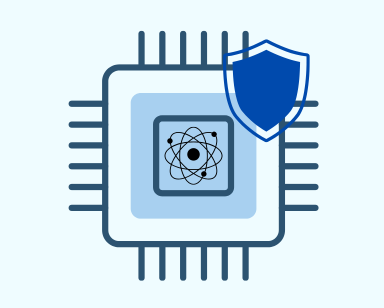3 March, 2025
Post Quantum Cryptography
Computer chip engineering has come a long way. Transistors marked a major shift in the computer industry since their invention. The number of transistors has roughly doubled every two years according to Moore's Law. Computer ships now fashion multiple cores, and clouds provide enormous compute capacity. Yet, none of this is enough to solve complex problems like breaking contemporary encryption algorithms used in the internet age. This includes encrypted data in transit and at rest. But, all this was predicted to change once a economically feasible quantum computer is invented.
Quantum computers exist today in their nascent forms. They are currently available on at least Google Cloud and AWS[2][3]. Microsoft, on the other hand, has introduced a quantum chip based on a Topological core architecture.[1][7] Microsoft claims that it has the path charted out to create a million qubit processor within the next decade.
Any user of these provider can access these quantum computers on-demand! Yet, their power is not enough to break encryptions. Then, what's the fuss all about?
Quantum Computers might achieve their usefulness threshold in another five to twenty years, according to Sundar Pinchai (CEO of Google) and Jensen Huang (CEO of Nvidia). [4][5] The concern is that data in its encrypted form today can be decrypted by quantum computers in the future. This concept is popularly known as "Harvest now, decrypt later". Post Quantum Cryptography (PQC) algorithms aims to protect data against just that!
A quantum computer is like any other tool in the hands of humanity. It can be used for beneficial and malicious purposes. An important malicious use case of quantum computer is decrypting data encrypted with current encryption algorithms. Technical teams in organizations, especially those that in financial, healthcare and other sectors with sensitive data must pay heed to the eventual materialization of quantum computers. Hence, adopting PQC algorithms is a need of the hour.
Post Quantum Cryptography (PQC) algorithms protect encrypted from being decrypted even by quantum computers. Currently the NIST of the USA has selected three algorithms to be included under PQC [8]. China, on the other hand, aims to develop its own PQC algorithms over fears that the US-developed algorithms might have backdoors. Algorithms which have been implemented as of now are:
-
CRYSTALS-Kyber, designed for general encryption purposes such as creating secure websites, is covered in FIPS 203.
-
CRYSTALS-Dilithium, designed to protect the digital signatures we use when signing documents remotely, is covered in FIPS 204.
-
SPHINCS+, also designed for digital signatures, is covered in FIPS 205.
The Government of India has formed a India Quantum Alliance under the Centre for Development of Telematics (C-DOT) to research the subject in the Indian context. C-DOT is tasked with developing a wide array of quantum communication products. [6]
C-DOT has already developed a Quantum Key Distribution (QKD) system based on Distributed Phase Reference (DPR) protocols, a quantum-safe encryptor capable of 80 Mbps of throughput and a quantum-safe Video IP Phone. The C-DOT also has formed and oversees multiple consortiums whose members are from industry and academic bodies. The consortiums each focus on a specific research area of quantum computers. [6]
-
https://azure.microsoft.com/en-us/solutions/quantum-computing/
-
https://aws.amazon.com/braket/
-
https://cloud.google.com/blog/products/compute/ionq-quantum-computer-available-through-google-cloud
-
https://thequantuminsider.com/2025/02/13/practical-quantum-computing-five-to-ten-years-away-google-ceo/
-
https://thequantuminsider.com/2025/01/08/nvidia-ceos-predictions-rain-on-quantum-stock-parade/
-
https://www.cdot.in/cdotweb/web/quantumAlliance.php
-
https://news.microsoft.com/source/features/innovation/microsofts-majorana-1-chip-carves-new-path-for-quantum-computing/
-
https://www.nist.gov/news-events/news/2023/08/nist-standardize-encryption-algorithms-can-resist-attack-quantum-computers
-
https://www.cdot.in/cdotweb/web/quantumAlliance.php
-
https://thequantuminsider.com/2025/02/18/china-launches-its-own-quantum-resistant-encryption-standard-bypassing-us-efforts/ [10]
Recent blogs

INFRA ENGINEERING 31 January 2025
Availability Engineering
Explore the various mechanisms to ensure high availability of your site on the cloud.
Read More
INFRA ENGINEERING 21 January 2025
Basics of Website Hosting
Explore what goes into hosting a website on the cloud, which is highly available and secure.
Read More...
SECURITY ENGINEERING 21 January 2025
Post Quantum Cryptography
Read about the current developments in Post Quantum Cryptography (PQC).
Read More...